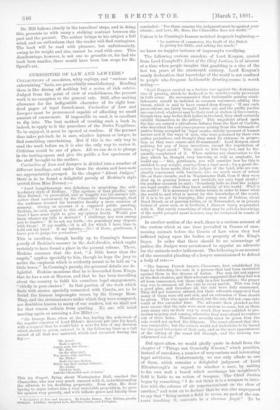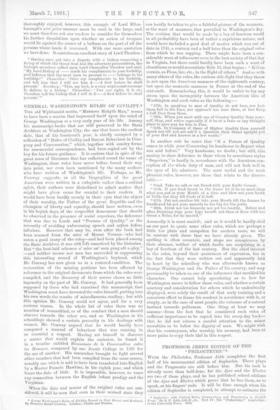CURIOSITIES OF LAW AND LAWYERS.* COLLECTIONS of anecdotes, witty sayings,
and "curious and entertaining" facts, are proverbially unsatisfactory. Reading them is like dining off nothing but a series of rich entrees. Judged from the point of view of readableness, the present work is no exception to the general rule. Still, after making allowance for the indigestible character of its eight hun- dred pages of legal forced-meat, Curiosities of Law and Lawyers must be pronounced capable of affording no small amount of amusement. If impossible to read, it is excellent to dip into. The best method of treating such a book is, indeed, to apply to it the procedure of the Sortes Vergiliana?. To be enjoyed, it must be opened at random. If the peruser thus takes pot-luck, he is sure, whether layman or lawyer, to find something entertaining. But if this is the only way to read the work before us, it is also the only way to review it. Criticism would be out of place. All we can do is to plunge in the tasting-spoon and give the public a few specimens of the stuff brought to the surface.
Curiosities of Law and Lawyers is divided into a number of different headings, and under these the stories and bons-mots are appropriately grouped. In the chapter "About Judges," there is to be found a delightful parody of Erskine's style quoted from Miss Burney :— • " Lord Loughborough was felicitous in mimicking the self- laudatory style of Erskine. The egotism of that pleader,' says Miss Burney, is proverbial, and so happily was his manner hit, rather than caricatured, by the Chancellor Loughborough, that the audience deemed his inventive faculty a more exorcise of memory. Giving an account of a supposed public mooting, Erskine, he said, opened to this effect : "As to me, gentlemen, I trust I have some right to give my opinion freely. Would you know whence my title is derived ? I challenge any man among you to inquire ! If he ask my birth,—its genealogy may dispute with kings ! If my wealth,—it is all for which I have time to hold out my hand If my talents,—No ! of these, gentlemen, I leave you to judge for yourselves !" ' " This is excellent, though hardly up to Canning's famous parody of Erskine's manner in the Anti-Jacobin, which ought certainly to have found a place in the present volume.. There, Erskine assumes that the text, "A little lower than the angels," applies specially to him, though ho begs the jury to notice the emphasis which is evidently meant to be laid on "a little lower." In Canning's parody, the personal details are de- lightful. Erskine mentions that he is descended from Kings, that he has a son at Harrow, and that he has been travelling about the country to fulfil his countless legal engagements, "chiefly in post-chaises." In that portion of the work which deals with stories specially connected with Courts, are to be found the famous impromptu verses by Sir George Rose. They, and the circumstances under which they were composed, are doubtless known to many of our readers, but we shall not for that reason refrain from quoting. No one will mind meeting again so amusing a Joe Miller :— " Sir George Rose, when at the bar, having the note-book of
the regular reporter of Lord Eldon's decisions put into his hand, with a request that he would take a note for him of any decision which should be given, entered in it the following lines as a full record of all that was material, which had occurred during the day ;—
'3fr. Leach Made a Fpeoch,
AllgrY,
Mr. H neat abut but wrong ;
ar, On the other part, Was heavy, dull, and long Mr. Parker Made the ease darker, Which was dark enough without : Mr, Cooke Cited his book, And the Chancellor said—I doubt.'
This jest d'esprit, flying about Westminster Hall, reached the Chancellor, who was very much amused with it, notwithstanding the allusion to his doubting propensity. Soon after, Mr. Rose having to argue before him a very untenable proposition, ho gave ' his opinion very gravely, and with infinite grace and felicity thus
* Ouriesitios of latt, and Lawyers. By Crooke James. New Edition, greatly enlarged. London Sampson Low, Marston, Searle, and 11 ivingtou.
concluded : 'For these reasons the judgment must be against your clients ; and here, Mr. Rose, the Chancellor does not doubt.'"
Unless it be Canning's famous metrical despatch beginning,- " In matters of commerce, the fault of the Dutch
Is giving too little, and asking too much,"
we know no happier instance of impromptu versifying.
The following curious anecdote of Lord Kenyon, quoted from Lord Campbell's Lives of the Chief Justices, is of interest at a time when people imagine that gambling is a vice of the last ten years of the nineteenth century. Lord Kenyon's manly declaration that knowledge of the world is not confined to people who frequent fashionable drawing-rooms is worth noting :— " Lord Kenyon carried on a furious war against the destructive vice of gaming, which he declared to be mischievously prevalent in both sexes. He recommended that fashionable gaming estab- lishments should be indicted as common nuisances, adding this threat, which is said to have caused deep dismay : If any such prosecutions are fairly brought before me, and the guilty parties are convicted, whatever may be their rank or station in the country, though they may be the first ladies in the land, they shall certainly exhibit themselves in the pillory.' This ungallant attack upon the fair sex roused a chivalrous defence from the Earl of Carlisle, who described the sad consequences arising from the tribunals of justice being occupied by 'legal monks, utterly ignorant of human nature and of the ways of men, who were governed by their own paltry prejudices, and thought they must be virtuous in proper. tion as they were coarse and ill.mannored.' Lord Kenyon oared nothing for any of these invectives, except the imputation of being a 'legal monk.' This stuck to him very fast, and he fre- quently complained of it. When making any observation to the jury which he thought very knowing as well as emphatic, he would say But, gentlemen, you will consider how far this is entitled to any weight, coming from a legal monk ; fof q groat dis- covery has been made, that tho judges of the land, who are con- stantly conversant with business, who see much more of actual life on their circuits, and in Westminster Hall, than if they were shut up in gaming houses and brothels, are only legal monks.' On another occasion he said : Somebody tells us that the judges are legal monks—that they know nothing of the world. What is the world ? It is necessary to define terms, in order to know what the world is, and what is meant by this knowledge of the world. If it is to be got by lounging, like young mon of fashion, about
Bond Street, or at gaming-tables, or at Newmarket, or in private houses of great men, or in brothels, I disavow being acquainted with it. But surely something of what may bo called a knowledge of the world guiequid agunt honeines, may be contained in courts of justice.' "
In another section of the work, there is a curious account of the custom which at one time prevailed in France of sum- moning animals before the Courts of Law when they had inflicted injury upon the bodies or property of the King's lieges. In order that there should be no miscarriage of justice, the Judges were accustomed to appoint an advocate for the animals under indictment. The following is an account of the successful pleading of a lawyer commissioned to defend a body of rats:— " The famous French lawyer, Chassaneo, first established his fame by defending the rats in a process that had been instituted against them in the diocese of Autun. Tho rats did not appear at the first citation, and their advocate suggested that they had not all been summoned, but those only in a few localities ; the proper way was to summon all the rats in every parish. This was held a good plea, and therefore all the rats were duly summoned. They did not however attend, but their advocate suggested that many of them were old and sick, and an extension of time should be given. This was again allowed, but the rats did not come into court at the extended time. The advocate then pleaded as the next excuse that the rats were most anxious to come, but as there were many cats on their way to court, they wore entitled to pro- tection in going and coming, otherwise they were afraid to venture out of their holes. Therefore security must be given that the cats would not molest the litigants. The court allowed that this was reasonable; but the owners would not undertake to he bound for the good behaviour of their cats, and so the next appointment of the sitting of the court' fell through, and the hearing was adjourned sine die."
Did space allow, we would gladly quote in detail from the chapter of " Things not Generally Known," which provides, instead of anecdotes, a number of very curious and interesting legal subtleties. Unfortunately, we can only allude to one of them, which contains a delightful judgment of Lord Ellenborough's in regard to whether a. man, by nailing to his own wall a board which overhangs his neighbour's field is liable to an action of trespass. The Chief Justice began by remarking, " I do not think it is a trespass to inter- fere with the column of air superincumbent on the close of another," and went on to declare that he was also unprepared to say that " firing across a field in vacuo, no part of the con- tents touching it, amounts to a clauston fregit." To be thoroughly enjoyed, however, this example of Lord Ellen- borough's nisi pries manner must be read in the large, and
we must therefore ask our readers to consider for themselves his further disquisition upon whether an action of trespass would lie against the owner of a balloon on the part of all the persons whose lands it traversed, With one more quotation we have done. It contains an excellent story of Lord Thurlow :
" Having once got into a dispute with a bishop respecting a living of which the Great Seal had the alternate presentation, the bishop's secretary called upon Lord Chancellor Thurlow and said, My Lord Bishop of — sends his compliments to your lordship, and believes that the next turn to present to — belongs to his lordship ?' Chancellor : Give my compliments to his lordship, and tell him that I will see him d—d first before he shall present.' Secretary : This, my lord, is a very unpleasant message to deliver to a bishop.' Chancellor : 'You are right, it is so ; therefore tell the bishop that / will be d—cl first before ho shall present.' "







































 Previous page
Previous page